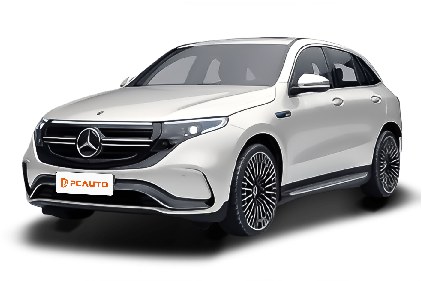Q
Does EQC euip with massage seats?
As a luxury electric SUV, the Mercedes-Benz EQC offers high-standard comfort configurations in the Malaysian market. However, the seat functions that come as standard from the factory may vary depending on the model version. Take the latest EQC as an example. Some high-end models do offer the option to install multi-way power-adjustable seats with a massage function. This configuration is usually integrated into the "Energizing Comfort" package, which includes a hot-stone massage mode and multiple intensity adjustments. However, the specific configuration should be based on the vehicle list provided by local Malaysian dealers.
Regarding the comfort configurations of luxury electric vehicles, currently, most brands offer the seat massage function through optional packages. For example, the comfort seat optional package of the BMW iX3 or the luxury seat kit of the Audi e-tron. This type of function mainly uses an airbag array to provide lumbar/shoulder pressure. However, there are differences in the massage program logic (such as wave-type or acupressure-type) and the body areas covered among different brands.
It is recommended that Malaysian consumers ask the dealer to demonstrate the actual massage effect when making a purchase. At the same time, note that this type of function usually needs to be paired with leather seats and memory functions to achieve the best experience. In addition, due to the quietness advantage of pure-electric vehicles, the massage function will not be disturbed by engine vibration during operation, which is also one of the unique advantages of electric vehicles in terms of comfort.
Special Disclaimer: This content is published by users and does not represent the views or position of PCauto.
Related Q&A
Q
Does EQC have parking assist?
Yes, the Mercedes-Benz EQC is indeed equipped with an advanced Parking Assist system. This feature helps drivers park more easily in the narrow parking spaces commonly found in Malaysia or in the congested urban environments. The EQC's Parking Assist system typically includes functions such as automatic parking into a space, parallel parking assistance, and a 360-degree camera. It uses ultrasonic sensors and cameras to monitor the surrounding environment in real-time. Some models even support remote parking, allowing drivers to control the vehicle into a parking space from outside the car via a mobile app.
This technology is especially useful for Malaysian drivers, particularly in busy cities like Kuala Lumpur, as it can significantly reduce the stress and risk of scratches when parking. Moreover, modern parking assist technology is not exclusive to Mercedes-Benz. Many other brands, such as BMW, Audi, and locally popular ones like Toyota and Honda, also offer similar systems, though the specific functions may vary depending on the model and configuration.
If you're interested in the EQC's parking assist features, it is recommended that you take a test drive at a nearby authorized Mercedes-Benz dealership to experience its convenience firsthand. At the same time, you can also compare the technical features of different brands to choose the model that best suits your needs.
Q
Does EQC have coolant?
Yes, as a pure-electric SUV, the Mercedes-Benz EQC doesn't have a traditional internal combustion engine, but it is still equipped with a cooling system, which includes coolant. The coolant is mainly used for temperature management of the battery pack, electric motor, and power electronics to ensure that these critical components operate within the optimal temperature range, thereby improving efficiency and extending their service life. In Malaysia's hot climate, the role of the cooling system is particularly important, as high temperatures may affect battery performance and the overall reliability of the vehicle. Although electric vehicles don't require frequent coolant replacement like fuel-powered vehicles, it is still necessary to regularly check the coolant level and condition. For the specific maintenance schedule, you can refer to the official Mercedes-Benz manual. In addition, the cooling system of an electric vehicle is usually more complex than that of a fuel-powered vehicle because it needs to manage the temperatures of multiple components simultaneously. This is also why the cooling system of the EQC is designed to be more precise. If you have more questions about the EQC's cooling system or other electric vehicle technologies, it is recommended to consult a Mercedes-Benz authorized service center, and they can provide more professional answers and maintenance advice.
Q
Does the Mercedes EQC have spare tyres?
As a pure-electric SUV, the Mercedes-Benz EQC doesn't come standard with a traditional spare tire in the Malaysian market. Instead, it's equipped with a Tire Repair Kit, which is a common configuration for many electric vehicles. This is mainly to reduce weight and save space, as electric vehicles are more sensitive to range and space utilization. The repair kit includes tire sealant and an air pump, which can handle minor tire punctures. However, in case of a blowout or severe damage, you still need to contact roadside assistance or go to a service center.
For Malaysian users, the tropical climate and complex road conditions may increase the risk of tire wear. It's recommended that car owners regularly check the tire condition (including tire pressure and wear) and know the location of the nearest authorized Mercedes-Benz service center for emergencies. If you're planning a long-distance trip or have a strong need for a spare tire, you can consult the dealer to see if there's an original-factory spare tire option. Some models may support the installation of a space-saver spare tire (at the cost of some trunk space).
Other luxury electric vehicles like the Audi e-tron or Jaguar I-PACE also adopt a similar design. Car owners can improve driving safety by planning their routes in advance and getting familiar with the use of emergency tools.
Q
How long does a Mercedes EQC battery last?
The battery life of the Mercedes-Benz EQC usually lasts about 8 to 10 years, depending on usage habits and maintenance. Under normal use, the battery capacity can maintain a health level of about 70% to over 80%, which can meet the daily driving needs. Mercedes-Benz offers an 8-year or 160,000-kilometer battery warranty for the EQC, whichever comes first, which reflects the manufacturer's confidence in the battery's durability. In Malaysia's hot climate, it is recommended that car owners avoid frequent fast charging and leaving the vehicle in high-temperature environments for long periods to extend the battery life. The degradation rate of electric vehicle batteries is affected by various factors, including charging frequency, driving style, and ambient temperature. Different from fuel vehicles, electric vehicle batteries do not require routine maintenance such as oil changes, but the battery status and cooling system still need to be checked regularly. The Malaysian government is actively promoting the use of electric vehicles, and the charging infrastructure is gradually being improved. In the future, the cost of electric vehicle maintenance and battery replacement is expected to be further reduced.
Q
Does EQC have air suspension?
As the brand's first all-electric SUV, the high-end version of the Mercedes-Benz EQC available in the Malaysian market is indeed equipped with the AIRMATIC air suspension system. This setup can adjust the shock absorber firmness and vehicle body height in real time via sensors, enhancing comfort and passability on various road conditions, which is especially suitable for some areas in Malaysia with poor road conditions. It's important to note that the air suspension is usually an optional feature or exclusive to high-end models in the EQC lineup. It is recommended that consumers confirm the specific configuration list with the dealer when making a purchase. Compared with traditional steel springs, the air suspension can offer a more refined vibration filtering performance, but it has a relatively high post-maintenance cost, which is particularly evident in hot and humid climate environments. Similar configurations are also available on electric vehicles in the same class, such as the Audi e-tron. However, the tuning styles of different brands vary slightly, and the EQC leans more towards a comfort-oriented setup. If you have sufficient budget and value the driving and riding quality, the air suspension is worth considering. But for regular urban commuting, the standard suspension is already practical enough.
Q
Should I charge my EQC to 100%?
For electric vehicles like the Mercedes-Benz EQC, whether to charge the battery to 100% depends on the balance between daily usage needs and battery health. The EQC is equipped with a lithium-ion battery. Frequent full charging over a long period may accelerate battery aging as a high state of charge increases the internal chemical stress on the battery. If your daily commute distance is short, it's recommended to set the charging limit between 80% and 90%. This can extend the battery's lifespan. However, when you're going on a long-distance trip or need the maximum range, it's acceptable to charge the battery to 100% occasionally. But it's advisable to use the vehicle as soon as possible after a full charge to prevent the battery from staying in a fully-charged state for an extended period.
In addition, the hot climate in Malaysia has a certain impact on the battery. Battery performance will decline in high-temperature environments. Therefore, it's recommended to charge the vehicle in a shaded area and avoid fast charging in extremely high temperatures. You can also maintain battery health by regularly using slow charging and avoiding extremely low battery levels (such as below 20%). The EQC's battery management system is quite advanced and can effectively optimize the charging process. However, reasonable usage habits can further enhance the battery's durability.
Q
How long does EQC take to charge?
The charging time of the Mercedes-Benz EQC depends on the charging equipment used and the battery capacity. Among the common charging methods in Malaysia, when using a home AC wall-mounted charging box (7.4kW), it takes about 11 hours to charge from 10% to full, which is suitable for overnight charging. On the other hand, a public DC fast-charging station (such as 50kW or higher power) can boost the battery level from 10% to 80% in about 40 minutes, significantly reducing the waiting time. However, it's recommended to use fast charging only for long-distance trips or emergencies to protect the battery life.
The EQC comes standard with a battery capacity of 80 kWh. The actual charging speed can also be affected by environmental temperature, battery condition, and fluctuations in the charging pile's power. For example, high temperatures may slightly reduce the charging efficiency. For Malaysian users, it's advisable to prioritize charging stations with a temperature management system and regularly use the Mercedes me app to monitor the charging status.
If the daily commuting distance is within 200 kilometers, only 2-3 slow charges per week are needed to meet the demand. It's also recommended to keep the battery level between 20%-80% to optimize the battery health.
Malaysia is currently expanding its charging network. Shopping malls and highway service areas in major cities like Kuala Lumpur and Penang are already equipped with fast-charging piles compatible with the CCS2 interface, making it convenient for EQC owners to plan their trips.
Q
Is the Mercedes EQC fast?
As a pure-electric SUV, the performance of the Mercedes-Benz EQC is truly worth paying attention to. It is equipped with a dual-motor all-wheel-drive system, with a combined output power of up to 300 kilowatts (408 horsepower) and a peak torque of 760 Newton-meters. The official 0 - 100 km/h acceleration time is 5.1 seconds. Such figures are more than sufficient for daily driving or high-speed overtaking scenarios in Malaysia, and it can even offer a nice sense of pushback. Compared with traditional fuel-powered SUVs, the EQC's electric powertrain provides instant torque output, making the start and acceleration much swifter. However, its top speed is electronically limited to 180 km/h, which is to balance the range and performance. For Malaysian users, the acceleration performance of the EQC is enough to meet their needs. But if you're after a higher top speed, you might need to consider other performance-oriented models. Moreover, the acceleration characteristics of electric vehicles are different from those of fuel-powered ones. The EQC's linear acceleration and quietness are also its unique advantages, which can provide a more comfortable experience in congested urban roads or long-distance drives.
Q
What is the range of Mercedes EQC in KM?
As a pure-electric SUV, the official data of the Mercedes-Benz EQC in the Malaysian market shows that its range is approximately between 400 and 450 kilometers (WLTP standard). The specific figure will fluctuate according to driving habits, road conditions, and climate conditions. The EQC is equipped with an 80-kWh lithium-ion battery pack and supports fast charging. It can be charged to 80% in about 40 minutes, making it suitable for urban commuting and short trips in Malaysia. For potential buyers of electric vehicles, they also need to pay attention to the distribution of charging infrastructure in Malaysia. Public charging piles are relatively common in major cities such as Kuala Lumpur and Penang, but it is advisable to plan charging stations in advance before long-distance travel. Additionally, the tropical climate may affect battery efficiency, so regular maintenance is recommended to maintain optimal performance. When compared with similar models, the EQC is competitive in terms of luxury and technological features, but its actual range performance may be slightly inferior to some new players that focus on energy efficiency. When choosing an electric vehicle, you can make a comprehensive consideration based on your daily driving needs and budget.
Q
What is the difference between Mercedes EQS and EQC?
The Mercedes-Benz EQS and EQC are two pure-electric vehicle models with different positioning. The main differences lie in vehicle class, range, and technological configuration. The EQS is Mercedes-Benz's flagship electric sedan, built on the dedicated EVA platform. It has a WLTP range of over 700 kilometers and is equipped with the Hyperscreen and advanced autonomous driving assistance systems, focusing on delivering a luxurious and high-tech experience.
On the other hand, the EQC is Mercedes-Benz's first mass-produced electric SUV, which is an improvement based on a fuel vehicle platform. It has a range of about 400 kilometers, making it more suitable for daily urban commuting, and its price is relatively affordable.
For Malaysian consumers, the EQS is more suitable for high-end users who pursue cutting-edge technology and long-distance driving, while the EQC better meets the practical needs of families. It's worth noting that the hot climate in Malaysia has a relatively small impact on the battery life of electric vehicles, but the charging infrastructure is still being improved. It is recommended to fully consider the charging convenience before purchasing a car. Both models support Type 2 and CCS2 charging standards, which are compatible with the local mainstream charging piles.
Popular Cars
Model Year
Car Compare
Car Photo
Latest Q&A
Q
Does more RPM mean more torque?
The relationship between engine speed (RPM) and torque is not a simple linear proportionality, but rather an inverse relationship under the premise of constant power. At low engine speeds, due to the extended fuel injection and intake duration, the combustion pressure inside the cylinders increases, resulting in higher torque output, which is suitable for scenarios requiring strong traction such as vehicle launch, hill climbing, or heavy loads. Conversely, torque decreases at high speeds, but power may increase to support high-speed driving. This characteristic stems from the physical formula "Power = Torque × Speed × Constant." Therefore, different vehicle models are calibrated for torque curves based on their intended purposes. For example, diesel engines or turbocharged engines typically emphasize high torque at low speeds, while high-performance vehicles prioritize power output at high speeds. In daily driving, rationally utilizing transmission gear ratios to match speed and torque (such as using first gear for high-torque hill climbing and higher gears for low-RPM cruising) can optimize fuel economy and dynamic performance.
Q
What is the maximum torque a human can apply?
The maximum torque that a human can apply with one hand typically ranges from 60 to 120 Newton-meters, with the specific value depending on individual strength, force application posture, and tool usage. When an average adult uses a standard wrench, a grip force of 200 Newtons can generate approximately 100 Newton-meters of torque when calculated with a 0.5-meter lever arm. However, due to muscle efficiency limitations, the actual output is mostly 50%-70% of the theoretical value. Professional athletes or manual laborers can achieve 25-30 Newton-meters through training, while specially trained individuals such as rock climbing enthusiasts can generate finger torque of up to 40 Newton-meters. Tools can significantly amplify torque output; for example, a regular wrench can multiply human force by 3-5 times, but sustained force application requires consideration of muscle fatigue. Daily operations like tightening screws or turning a steering wheel typically maintain torque within the range of 5-50 Newton-meters. Torque calculation follows the physical principle of force multiplied by lever arm, and in practical operations, attention should be paid to the influence of force application angle and joint range of motion on the final torque value.
Q
What is low RPM high torque?
Low RPM high torque refers to the characteristic of an engine that can deliver substantial torque within a relatively low RPM range (typically 1500-3000 rpm). This design significantly enhances a vehicle's launch acceleration and hill-climbing capability. When engine power remains constant, torque is inversely proportional to RPM. Consequently, generating high torque at low RPM enables the crankshaft to produce greater power per revolution, providing ample traction without requiring high engine speeds—particularly advantageous for urban stop-and-go driving or mountainous terrain. Turbocharged models often excel in this regard; for instance, certain popular local SUVs achieve peak torque at 1800 rpm, facilitating loaded hill ascents or overtaking maneuvers. By contrast, low-torque engines must rely on higher RPMs to compensate for power deficiency, resulting in increased fuel consumption and acceleration lag. Notably, the low-RPM high-torque characteristic also reduces shift frequency, minimizes mechanical wear, and improves driving smoothness—especially beneficial for drivers frequently encountering congested conditions. When evaluating this parameter during vehicle selection, prioritize models whose torque curve peaks earlier, typically indicated in specifications as "XX N·m @ 1500-4000 rpm."
Q
How much torque is 1800 RPM?
The torque value at 1800 RPM needs to be calculated in combination with engine power, and the specific numerical value depends on the power output at this rotational speed. According to the physical formula "Power = Torque × Rotational Speed ÷ 9550", when power is constant, torque is inversely proportional to rotational speed. This means that when the engine speed is 1800 RPM, if the vehicle is in a low-speed, high-load working condition (such as climbing a slope or starting with a heavy load), the torque output will be relatively high to provide sufficient traction; while during flat-road cruising, the torque at the same rotational speed may decrease moderately to optimize fuel efficiency. Turbocharged engines usually form a wide torque plateau in the range of 1500-4500 RPM, and 1800 RPM falls precisely within this range, delivering over 90% of the peak torque. For example, a 1.5T engine can generate approximately 250-300 Nm of torque at this rotational speed. In actual driving, by monitoring the tachometer and coordinating throttle control, the torque characteristics at this rotational speed can be effectively utilized to achieve smooth acceleration or overcome gradients. It should be noted that different engine calibrations will result in variations in torque curves, so it is recommended to consult the torque-speed curve diagram of the specific vehicle model to obtain accurate data.
Q
Why is it almost impossible to rev to 21000 RPM?
It is nearly impossible to increase the engine speed to 21,000 revolutions per minute, primarily constrained by the comprehensive limitations of material physical limits, mechanical structural strength, and engineering design. The inertial forces exerted on moving components within the engine, such as pistons and connecting rods, at ultra-high speeds would far exceed the tensile strength of metallic materials, resulting in component deformation or even fracture. Taking current mass-produced naturally aspirated engines as an example, the Lexus LFA's 9,000 revolutions per minute already approaches the acoustic and mechanical balance limits of naturally aspirated engines, while turbocharged engines like the Bugatti Veyron, which prioritize low-end torque output, typically limit the redline speed to approximately 6,400 revolutions per minute. Furthermore, emission regulations and noise standards further diminish the viability of ultra-high-speed engines, with modern technology favoring efficiency improvements through turbocharging or hybrid systems. Even for diesel engines, their compression ignition characteristics generally result in lower maximum speeds compared to gasoline engines, typically not exceeding 5,000 revolutions per minute. These technical challenges and safety considerations collectively determine that achieving 21,000 revolutions per minute remains within the theoretical realm under current engineering frameworks.
View MoreRelated News

Nvidia Announces Mercedes-Benz CLA as the First Vehicle with DRIVE AV Autonomous Driving Technology
MichaelJan 8, 2026

Brand New Mercedes-Benz GLC with EQ Technology Coming Soon: A Larger, Faster, and More Efficient Luxury All-Electric SUV
LienDec 11, 2025

Mercedes-Benz GLC200 4Matic debuts, offering a more accessible entry price at RM329,888
LienDec 11, 2025

Mercedes-Benz invests in an autonomous driving technology company under Geely named Qianli
AshleySep 25, 2025

Benz launches its first car equipped with solid-state batteries, capable of traveling 1,205 kilometers on a full charge
WilliamSep 10, 2025
View More














Pros
Cons